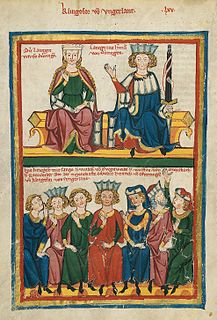 W
WMinnesang was a tradition of lyric- and song-writing in Germany and Austria that flourished in the Middle High German period. This period of medieval German literature began in the 12th century and continued into the 14th. People who wrote and performed Minnesang were known as Minnesänger, and a single song was called a Minnelied.
 W
WThe Codex Manesse is a Liederhandschrift, the single most comprehensive source of Middle High German Minnesang poetry, written and illustrated between c. 1304 when the main part was completed, and c. 1340 with the addenda.
 W
WFrau Minne is a personification of courtly love in Middle High German literature. She is frequently addressed directly in Minnesang poetry, usually by the pining lover complaining about his state, but she appears also in the longer Minnerede poems, and in prose works.
 W
WThe Jenaer Liederhandschrift is a 14th-century manuscript containing lyrics and melodies to songs in Middle High German. The majority of the lyrics belong to the genre of Spruchdichtung and, with 91 melodies, the manuscript is the single most important source for the music of this genre.
 W
WThe Kleine Heidelberger Liederhandschift is a collection of Middle High German Minnesang texts. In Minnesang scholarship it is referred to as MS. A. It is held by the Heidelberg University Library with the signature Cod.Pal.germ. 357.
 W
WThe Sängerkrieg, also known as the Wartburgkrieg, was a contest among minstrels (Minnesänger) at the Wartburg, a castle in Thuringia, Germany, in 1207.
 W
WThe Weingarten Manuscript is a 14th-century illuminated manuscript containing a collection of Minnesang lyrics. It is currently in the Württembergische Landesbibliothek, Stuttgart, with the shelf-mark HB XIII 1. In Minnesang scholarship it is referred to as Manuscript B.